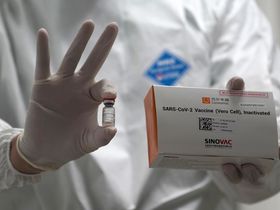
A second booster helped protect older people from Omicron infection, but waned quickly, an Israeli study says.
The C.D.C. director encourages older people to get second booster shots.
Three more Democratic representatives test positive for the coronavirus.
A second booster shot of the Pfizer-BioNTech Covid vaccine provides additional short-term protection against Omicron infections and severe illness among older adults, according to a large new study from Israel.
But the booster’s effectiveness against infection in particular wanes after just four weeks and almost disappears after eight weeks. Protection against severe illness did not ebb in the six weeks after the extra dose, but the follow-up period was too short to determine whether a second booster provided better long-term protection against severe disease than a single booster.
The study focused on adults ages 60 and older, and did not provide data on the effectiveness of a second booster in younger populations.
The findings, published on Tuesday in the New England Journal of Medicine, suggest that additional boosters are likely to provide fleeting protection against Omicron infections in older recipients, and are consistent with evidence that vaccine effectiveness against infection wanes faster than against severe disease.
“For confirmed infection, a fourth dose appeared to provide only short-term protection and a modest absolute benefit,” the researchers wrote.
The results come in the midst of a debate over whether and when Americans might need additional boosters. The Food and Drug Administration is convening a panel of outside advisers on Wednesday to discuss the broader U.S. booster strategy.
The rapid spread of the highly transmissible Omicron variant, which can evade some of the body’s immune defenses, has intensified the discussion of whether second boosters are broadly necessary.
Last month, the F.D.A. authorized second booster shots of the Pfizer-BioNTech and Moderna vaccines for adults ages 50 and older, as well as immunocompromised people ages 12 and older. The agency also authorized an mRNA booster for adults who have already received two doses of the Johnson & Johnson vaccine.
It’s likely to be a tough sell: While 66 percent of Americans have been vaccinated, just 30 percent have received a booster shot.
It is clear that the Omicron variant has blunted the effectiveness of Covid vaccines, but data on the benefits of a second booster remains limited. A previous study from Israel, which has not yet been published in a scientific journal, found that older adults who received a second booster were 78 percent less likely to die of Covid-19 than those who had received just one booster shot.
But scientists criticized the study’s methodology, and the benefits of a second booster for young, healthy adults are less clear. Some experts note that most adults who have been vaccinated and boosted once are already likely to be protected from severe illness and death.
On Jan. 2, Israel authorized a fourth dose of the Pfizer-BioNTech vaccine for adults ages 60 and older and members of other high-risk populations who had received their third shots at least four months earlier. Israel’s vaccination campaign has relied heavily on the Pfizer-BioNTech vaccine.
The new study is based on records from the Israeli Ministry of Health on more than 1.2 million older adults who were eligible for the fourth shot between Jan. 10 and March 2, when Omicron was the dominant variant in the country.
The researchers compared the rate of confirmed virus infections and cases of severe Covid-19 among those who had received a fourth dose to those who had received just three doses.
Protection against infection appeared to peak four weeks after the fourth shot: the rate of confirmed infections was twice as high in the three-dose group as in the four-dose group. By eight weeks after the fourth shot, however, the additional protection against infection had almost disappeared, the researchers found.
Rates of severe disease were 3.5 times higher in the three-dose group than the four-dose group four weeks after the booster shot, the researchers found. That protection did not appear to wane and actually ticked up slightly by the sixth week after the shot, when rates of severe disease were 4.3 times higher in the three-dose group.
But the study covered a relatively short period, and whether the benefits against illness hold up over the longer term remains unknown. The study did not report data on deaths.
Dr. Rochelle P. Walensky, director of the Centers for Disease Control and Prevention, said Tuesday that her agency “really would encourage people who are over 50 who have underlying medical conditions and those over the age of 65” to get a second booster shot.
Her remarks at a White House briefing were her clearest statement to date on who should get what for most people amounts to a fourth shot against the coronavirus.
Last week, the Food and Drug Administration authorized a second booster of Pfizer-BioNTech or Moderna’s vaccines for everyone over 50 and many immunocompromised people, four months after the first booster. At the time, Dr. Walensky said that the option was “especially important” for those over 65, as well as for those over 50 with chronic health problems, such as diabetes or obesity. Still, before Tuesday’s briefing, some health experts said they were unsure whether to recommend the second booster for those groups.
“I think there is confusion,” said Dr. Jose Romero, Arkansas’s health secretary who chairs the C.D.C.’s outside expert advisory committee on vaccine policy. He said leaders of some other state health departments had voiced the same reaction.
“It’s been a bit of a challenge for our communications department to work out the infographic on how to explain” who should get the second booster and with what vaccine, Dr. Romero added.
The decision to offer a second booster continues to generate controversy, with some immunologists and vaccine experts arguing that the federal government lacked enough data to justify the move, at least for those younger than 65. Some of that criticism will likely be aired on Wednesday at a public meeting of the F.D.A.’s outside advisory committee of experts where the broader U.S. booster strategy is set to be discussed.
At least 30 million Americans are now eligible for a second booster dose, including 10 million individuals ages 50 through 64 years, and 20 million individuals ages 65 years and older, a C.D.C. spokesman said.
Federal regulators initially leaned toward giving everyone 60 or 65 and older the option of a second booster, based heavily on data from Israel, which has been offering the additional shot to those 60 and older since early January. They decided to include people as young as 50, they said last week, because about one-third of Americans between 50 and 65 have serious health problems.
Dr. Peter Marks, who is in charge of vaccine regulation for the F.D.A., has said that trying to limit eligibility to certain people with chronic conditions would have been too confusing.
In an interview on the podcast “In the Bubble” this week, he said, “Unfortunately, medical comorbidities are often in the eye of the beholder.” Some people with such conditions don’t realize it, he said, while others may claim to suffer from them when they actually don’t.
Federal regulators said people could pick between the two brands of mRNA vaccines for their second booster regardless of their first booster’s brand. Asked on the podcast whether people should choose a different booster than their earlier shots, Dr. Marks said that while there was “a little bit of data” that switching vaccines may provide better protection, “probably the more important thing is just to get boosted with whatever vaccine you can get.”
Dr. Nirav D. Shah, head of Maine’s state health agency and president of the Association of State and Territorial Health officials, said regulators were right to make age the only criteria this time. When the federal government rolled out the first booster shots in the fall, he said, the C.D.C.’s eligibility criteria, with age and health conditions both as factors, baffled many people.
He said he tried to further simplify the C.D.C.’s guidance on second boosters last week for Maine residents. “I tried to remedy some of the confusion with clarity on our part,” he said.
The day after the C.D.C. updated its guidelines, he said, “I just went on Twitter and said, ‘You know what, if you’re eligible, you should just do it.’”
In Maine, the uptake has been brisk. “Our vaccination numbers shot up over the last couple days,” Dr. Shah said.
Not in Arkansas. “This is a trickle, a trickle,” Dr. Romero said.




贴纸和 GIF 是 纸飞机中文版 聊天中的乐趣,丰富了用户的表达方式。